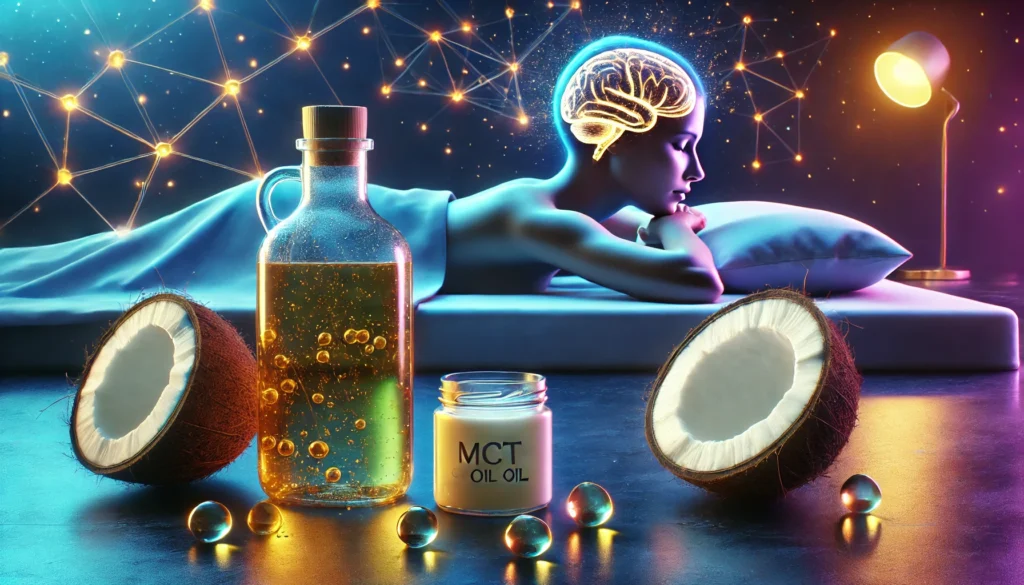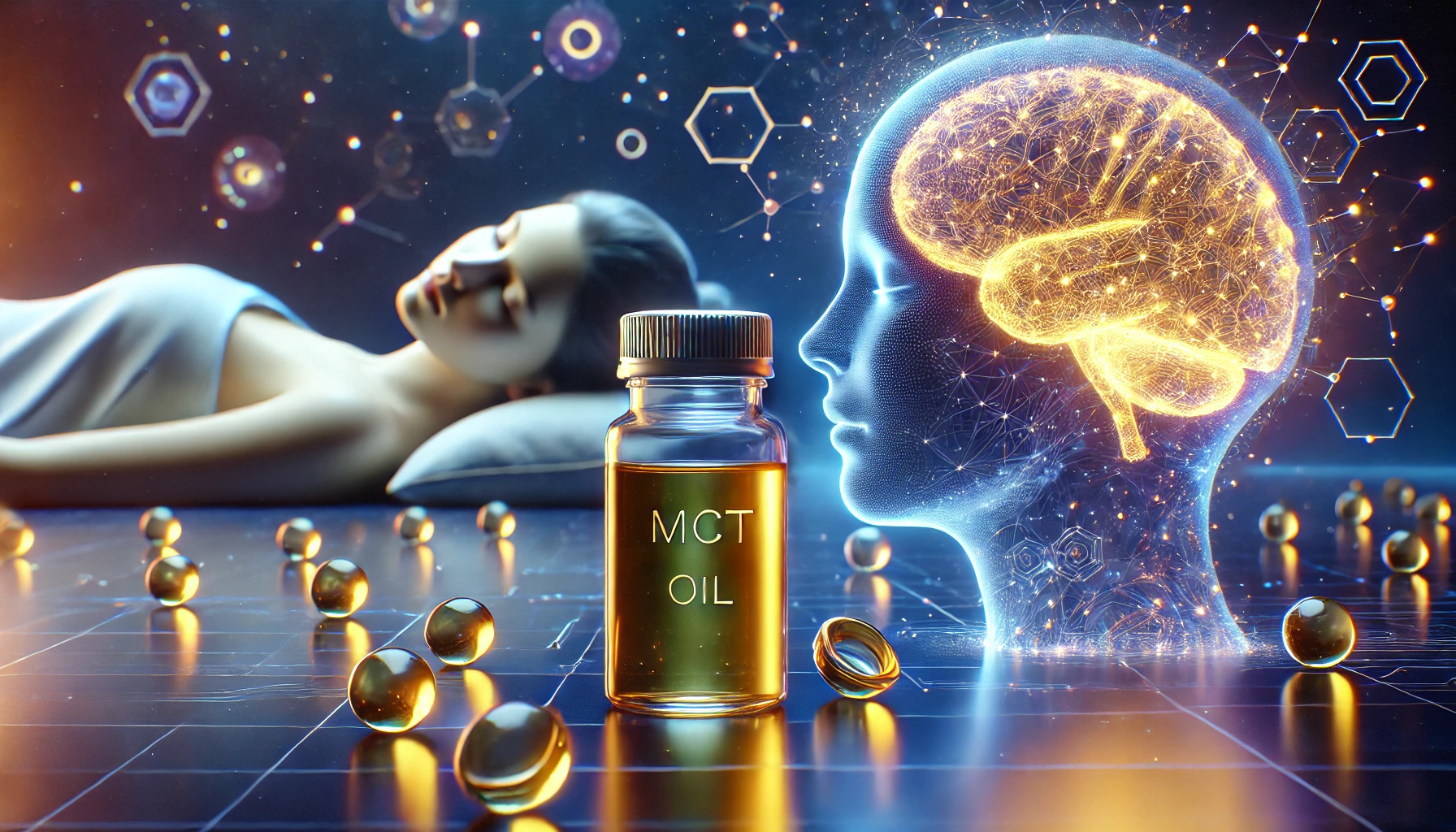In recent years, medium chain triglycerides (MCT) have attracted a lot of attention as a dietary supplement with numerous health advantages. MCTs, which are specifically generated from coconut oil, are a special family of fatty acids that have been associated with improving your memory, and energy levels and allowing you to have better sleep. In this article, we examine the chemical characteristics of MCTs, their impacts on the body and brain, and the most effective ways to include MCTs in daily life for the greatest outcomes.
You May Also Like:
Vitamin D: Benefits, Dosage, Side Effects, Drug Interactions, and Other Important Information
Moringa: Drug and Supplement Interaction Profile
Nature of MCTs
In contrast to long-chain triglycerides (LCTs), which have carbon atoms ranging from 13 to 21, MCTs are saturated fatty acids with 6 to 12 carbon atoms. Coconut oil is a rich source of MCTs, with MCTs making up roughly 50–60% of its fatty acid content. For instance, Caprylic acid (C8), capric acid (C10), and lauric acid are the three main MCTs found in coconut oil (C12).
Compared to LCTs, MCTs are digested differently. MCTs may quickly absorb and be used as an energy source because of their shorter chain length, which allows them to skip the normal digestive processes that LCTs go through. MCTs are immediately taken to the liver after ingestion, where they undergo ketone body synthesis. The brain can use ketone bodies as a substitute for glucose. Glucose is the primary energy source for the brain. Hence, MCTs may boost cognitive function according to their distinctive metabolic mechanism.
Health Benefits of MCTs
1. Better Sleeping Conditions
There is evidence to support the idea that MCTs may improve the quality of sleep. MCT supplementation has been demonstrated in animal experiments to lengthen non-rapid eye movement (NREM) sleep. This type of sleep is essential for physical recovery and memory consolidation. Although the precise methods by which MCTs affect sleep are still unclear, they may entail the modulation of neurotransmitters including serotonin and gamma-aminobutyric acid (GABA).
2. Improved Concentration and Cognitive Function
Particularly in people with mild cognitive impairment or neurodegenerative disorders like Alzheimer’s, MCTs have been linked to enhanced cognitive function. The ketone bodies produced by MCT metabolism can give neurons a different energy source, possibly enhancing brain function and slowing cognitive decline. Aside, brain-derived neurotrophic factor (BDNF) which supports the health of neurons and cognitive function may also be produced when MCTs are consumed.
3. Enhanced Creativity
It is conceivable that the cognitive advantages of MCTs could translate into improved creative thinking, even though the relationship between MCTs and creativity has not been directly explored. With better focus, memory, and mental clarity, they may help the creative process by encouraging the development and incorporation of new ideas.

Chemistry of MCTs
The carbon chain length of MCTs are esters of glycerol and medium-chain fatty acids. As mentioned, caprylic acid (C8:0), capric acid (C10:0), and lauric acid are the three main acids found in coconut-derived MCTs (C12:0). The distinct physicochemical characteristics of MCTs affect their absorption and metabolism which are governed by their chemical structure. Due to their shorter chains than long-chain triglycerides (LCTs), MCTs have a higher water solubility, which enables them to form smaller micelles that speed up absorption.
Physiological Mechanism of Action of MCTs
MCTs influence the body and brain via a number of physiological pathways, including:
1. Quick Absorption and Metabolism: MCTs are absorbed straight from the small intestine into the portal vein. On the contrary, LCTs need to be digested with bile salts and pancreatic lipase. MCTs can bypass the lymphatic system and travel straight to the liver where they are processed to create ketone bodies thanks to the quick absorption.
2. Formation of Ketone Bodies: Acetyl-CoA, which is produced by the liver involves the oxidation of MCTs. MCTs then form into ketone bodies which mainly consist of hydroxybutyrate (BHB) and acetoacetate. When glucose is scarce, ketone bodies can pass the blood-brain barrier and provide neurons with an alternate energy source.
3. Modulation of Neurotransmitters: Gamma-aminobutyric acid (GABA) and serotonin are the two neurotransmitter systems that are essential for controlling sleep, mood, and cognition, and may be affected by MCTs. Acetylcholine which is a neurotransmitter crucial for learning and memory processes may be impacted by MCTs as well.
4. Neuroprotection and Neurogenesis: By lowering oxidative stress and inflammation in the brain, ketone bodies produced from MCTs may protect your brain.
In conclusion, the chemistry of MCTs affects how they are absorbed and processed, which results in the creation of ketone bodies that may be used by the brain. Rapid absorption, the creation of ketone bodies, the alteration of neurotransmitters, and the stimulation of neurogenesis and neuroprotection are the portals in which the MCTs work physiologically. These systems work together to support the potential advantages of MCTs for creativity, focus, and sleep.

Optimal Dosage of MCTs
The right amount of MCTs to take for a specific person depends on a variety of variables, including age, health, and personal objectives. The majority of studies have looked at MCT intakes of 5 to 45 grams daily. To begin with, it is advised to take less MCTs, and as the body adjusts, gradually increase the amount. Gastrointestinal discomfort can result from a sudden ingestion of significant doses of MCTs.
Side Effects of MCTs
MCTs are often well accepted, however, some people may suffer minor adverse effects, especially when introducing MCTs to their diet for the first time. The gastrointestinal symptoms, such as diarrhea, nausea, and cramping, are the most typical adverse effects. Usually, when the body becomes used to the higher intake of MCTs, these symptoms go away. It is advised to start with a lower dose and gradually raise it over time to reduce the possibility of negative effects.
Potential Substance Interactions with MCTs
There isn’t much knowledge currently available on possible drug interactions involving MCTs. Nonetheless, it’s possible that MCTs perform better when combined with other cognitive enhancers. Studies have demonstrated that combining coffee with MCTs has a stronger effect on cognitive function than either substance by itself. Certain fat-soluble vitamins, such as vitamin D and vitamin E, may have improved bioavailability due to MCTs. Therefore, it is important to consider these interactions when incorporating MCTs into a supplement program.
Best Responsible Use of MCTs
It is crucial to abide by responsible usage recommendations if you want to reap the full benefits of MCTs for sleep, focus, and creativity. They consist of:
1. Gradually increase the dosage: To reduce gastrointestinal adverse effects, start with a modest dose of MCTs and gradually increase the consumption.
2. Consistency: Include MCTs regularly in your daily routine. MCT consumption over a prolonged period of time is anticipated to have the greatest impact on cognitive function.
3. MCT source quality: Not all MCT supplements are made equally. To guarantee the best possible bioavailability and effectiveness, it is essential to select a high-quality, pure MCT product. A great example of a supplement that synergistically blends MCTs with other cognitive-improving substances in a highly bioavailable formulation is Gamma Brain Luxury from Brain Luxury.
4. Mixing MCTs with other dietary supplements: To further improve cognitive performance, you can consider combining MCTs with other dietary supplements that also improve cognition, such as caffeine or particular vitamins. MCTs and other synergistic compounds are included in Gamma Brain Luxury by Brain Luxury, which makes it a great option for people who want to improve their cognitive function.
People can use the power of MCTs to unleash their full cognitive potential by following these recommendations and choosing premium goods like Gamma Brain Luxury by Brain Luxury.
Medium chain triglycerides (MCTs): Conclusion
In conclusion, medium chain triglycerides (MCTs) are a great option for supplements that are generated specifically from coconut oil. It can improve your energy levels and cognitive function due to their rapid absorption and utilization by the body.
Aside from fast adsorption, MCTs have also been shown to form into ketone bodies which can support energy levels. While generally safe for most individuals, it is important to incorporate MCTs into your diet gradually to avoid potential gastrointestinal discomfort. You can look out for trusted sources such as Gamma Brain Luxury to obtain pure and high-quality sources of MCTs. However, as with any supplement, it is advisable to consult with a healthcare professional to determine if MCTs are suitable for your specific health needs and goals.

References
- Wang, Y., Liu, Z., Han, Y., Xu, J., Huang, W., & Li, Z. (2018). Medium Chain Triglycerides enhances exercise endurance through the increased mitochondrial biogenesis and metabolism. Retrieved from: PloS One, 13(2), e0191182.
- Chapman-Lopez, T. J., & Koh, Y. (2022). The Effects of Medium-Chain triglyceride oil supplementation on endurance performance and substrate utilization in healthy populations: a systematic review. Retrieved from: Journal of Obesity & Metabolic Syndrome, 31(3), 217–229.
- Watanabe, S., & Tsujino, S. (2022). Applications of Medium-Chain triglycerides in foods. Retrieved from: Frontiers in Nutrition, 9.
Important Note: The information contained in this article is for general informational purposes only, and should not be construed as health or medical advice, nor is it intended to diagnose, prevent, treat, or cure any disease or health condition. Before embarking on any diet, fitness regimen, or program of nutritional supplementation, it is advisable to consult your healthcare professional in order to determine its safety and probable efficacy in terms of your individual state of health.
Regarding Nutritional Supplements Or Other Non-Prescription Health Products: If any nutritional supplements or other non-prescription health products are mentioned in the foregoing article, any claims or statements made about them have not been evaluated by the U.S. Food and Drug Administration, and such nutritional supplements or other health products are not intended to diagnose, treat, cure, or prevent any disease.

